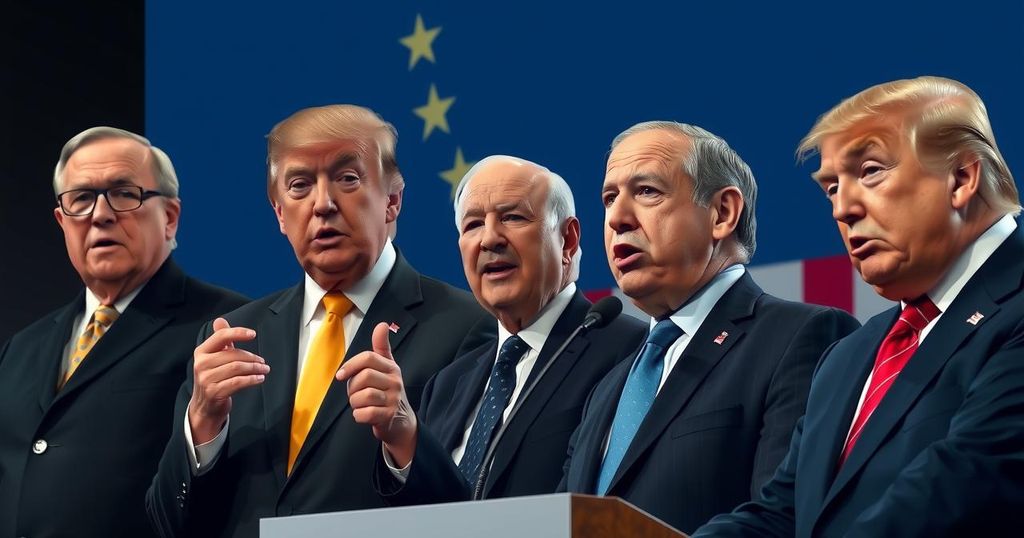Following Donald Trump’s election victory, global leaders respond with a mixture of optimism and concern. NATO and European leaders welcome his return but express worries about U.S. commitments to NATO, support for Ukraine, and Middle Eastern conflicts. In Asia, allies expect a more aggressive stance against China. The overall sentiment is cautious as the world braces for potential changes in Trump’s foreign policy approach.
In the wake of Donald Trump’s decisive election victory, global leaders have expressed a mix of optimism and concern regarding the potential implications of his second term. Trump, who reached the necessary electoral college votes to secure his position, emphasized his commitment to prioritizing American interests and envisioned a “golden age” for the United States in his victory speech. The international community is now anticipating whether his presidency will disrupt established alliances and international norms, particularly given his previous confrontational approach toward allies. Notably, NATO Secretary-General Mark Rutte welcomed Trump’s victory, underscoring the importance of unity in facing global challenges such as the alignment of China, Russia, North Korea, and Iran. Despite Trump’s history of criticizing NATO allies for inadequate defense spending, Rutte praised his past efforts to encourage member countries to increase their investments in defense. European leaders, including British Prime Minister Keir Starmer and French President Emmanuel Macron, have also reached out with congratulations as they brace for potential shifts in transatlantic relations. Simultaneously, concerns linger regarding the U.S. commitment to Europe and the ongoing support for Ukraine amidst the Russian invasion. President Volodymyr Zelenskyy expressed hope that Trump’s mantra of “peace through strength” would facilitate progress for Ukraine. In contrast, voices from Moscow remained muted, emphasizing the strained state of Russia-U.S. relations. In the Middle East, the focus turns to how Trump, known for his bold diplomatic moves, will address the escalating conflicts involving Israel, Hamas, and Hezbollah. Israeli Prime Minister Benjamin Netanyahu heralded Trump’s return as a pivotal moment for U.S.-Israel relations. Conversely, Hamas’s response remains contingent upon the new administration’s actions and policies regarding Palestinian rights. The situation is equally delicate in Asia, where apprehension mounts as Trump is expected to resume his aggressive economic stance towards China, including implementing tariffs and confronting issues surrounding Taiwan. Diplomatic allies in the Indo-Pacific region are already signaling their desire for stronger cooperation with the incoming president. Japan and South Korea articulated hopes for a robust alliance and leadership under Trump, amidst rising tensions with North Korea. As world leaders navigate the uncertainty of Trump’s administration, the ramifications of his policies on global governance, security alliances, and international relations will undoubtedly unfold in the coming months, keeping observers on high alert for the effects of his mandate.
The article covers the ramifications of Donald Trump’s return to the presidency following a decisive electoral victory. It highlights the reactions of various global leaders to his win and speculates on the potential instability his administration might introduce to international relations. The emphasis is on NATO’s concerns, European leaders’ cautious congratulations, the delicate situation in the Middle East, and the anticipated challenges concerning China and the Asia-Pacific region. The reactions reflect a spectrum of anxiety and hope as leaders prepare for a new phase in American foreign policy under Trump.
In conclusion, Donald Trump’s re-election has elicited varied responses from world leaders, characterized by a blend of optimism regarding potential partnerships and trepidation over U.S. foreign policy’s unpredictable nature. While NATO leaders look forward to continued collaboration, concerns about security commitments to Europe and the ongoing crisis in Ukraine loom large. Additionally, Trump’s approach towards the Middle East and China remains uncertain, reflecting a critical moment for international relations and alliances as the world anticipates the impact of his presidency.
Original Source: www.pbs.org






